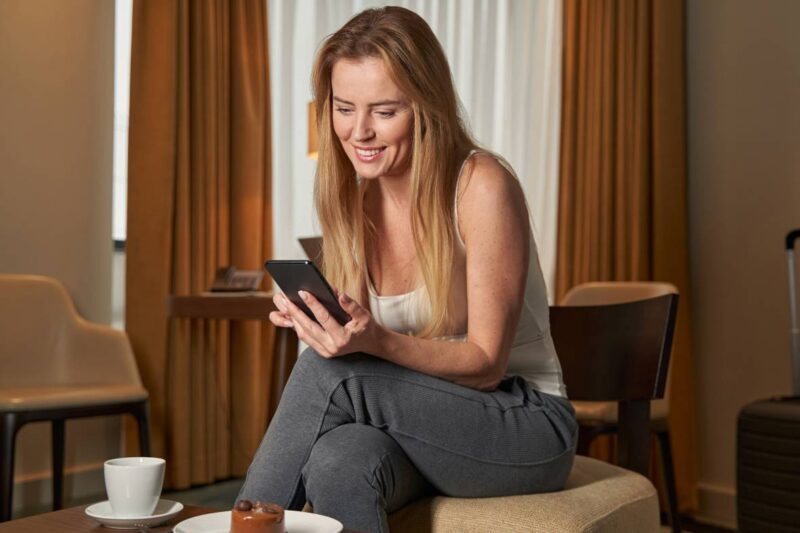Hotels continually grapple with a myriad of challenges ranging from technological advancements and changing consumer preferences to unforeseen global events.
To navigate these complexities and ensure the sustained success of their operations, hotels are increasingly turning to innovative solutions.
This article delves into transformative strategies that empower hotels to proactively tackle the multifaceted obstacles they encounter, fostering resilience, adaptability, and an elevated level of hotel service.
What Are The Current Challenges Faced By Hotels?
Innovation in the hospitality industry is no longer an option; it is a necessity. Hotels must constantly adapt to changing customer expectations, market trends, and technological advancements to ensure a top-notch leadership image and remain competitive.
“Staff shortages, digital adoption competition, and environmental concerns are just some of the current issues in hospitality that every business and professional should be aware of.”
- The Seven Biggest Current Issues in the Hospitality Industry in 2023 by Torrens
Encountering obstacles in daily operations is a given if you as a hotelier are seeking to enhance the overall guest experience. Here are a few current challenges that numerous hotels are facing in the face of evolving guest preferences.
1. Health and Safety Measures
The hospitality landscape has heightened concerns regarding cleanliness, sanitation, and guest well-being. Hotels face the challenge of implementing stringent protocols to ensure a safe environment for guests and staff, including contactless solutions like keyless entry systems and digital payments to minimize physical contact.
2. Technology Adoption
Keeping up with the latest technology trends and integrating them into hotel operations can be challenging. This includes implementing efficient booking systems, mobile check-in/check-out, and other digital services.
3. Staff Recruitment and Training
Staff shortages in hospitality pose persistent challenges, fueled by high turnover rates and seasonal fluctuations in demand. The demanding nature of these roles, with long and irregular hours, contributes to difficulties in recruitment and retention. Short-staffed hotels struggle to maintain service standards, impacting guest satisfaction and overburdening existing employees.
Finding and retaining skilled staff is an ongoing challenge for hotels. The industry relies heavily on customer service, and having well-trained and motivated staff is essential for guest satisfaction.
4. Environmental Sustainability
There is an increasing focus on sustainable and eco-friendly practices in the hospitality industry. Hotels are challenged to adopt environmentally friendly initiatives while balancing cost considerations.
5. Security Concerns
Data security and privacy have become pressing issues for hotels due to the increasing digitization of guest information and the industry’s susceptibility to cyber threats. Cybersecurity risks, including data breaches and ransomware attacks, pose significant challenges, potentially compromising guests’ personal details and payment information. Compliance with stringent regulations like GDPR and CCPA further underscores the need for robust data protection measures.
6. Changing Consumer Preferences
Consumer preferences and expectations are evolving. Hotels must adapt to new trends such as the demand for unique experiences, personalized services, and sustainable practices to keep the clients flowing steadily.

Tackling Hotel Challenges With Innovative Hospitality Solutions
Addressing Staffing Challenges in the Hotel Industry
The hotel industry is no stranger to staffing challenges. High turnover rates and difficulty in attracting and retaining skilled workers have become common issues faced by hotels.
The first step in addressing staffing challenges is to optimize workforce management through technology. Hotel management software can help automate scheduling, time tracking, and employee communication, reducing the administrative burden on managers and allowing them to focus on more strategic tasks.
Furthermore, hotels can leverage online platforms and social media to attract and recruit top talent. Using data analytics and AI-driven recruitment tools can help identify candidates with the right skills and cultural fit, saving time and resources in the hiring process.
To improve employee retention, hotels can implement flexible work arrangements and partner with the right resources to prioritize employee wellness. Offering flexible schedules, remote work options, employee training, and development programs, and work-life balance initiatives can help create a positive work environment and reduce employee burnout.
Contactless check-in solutions can also alleviate staff shortages by enabling self-service options like kiosks or mobile apps, reducing front-desk traffic and wait times. These systems streamline operations, allowing staff to focus on personalized guest service rather than routine check-in procedures. Operational efficiency improves as resources can be reallocated, optimizing workforce utilization. Guests benefit from 24/7 accessibility, convenience, and the ability to customize their experience, enhancing guest satisfaction without the need for constant staff presence.
Leveraging Technology for Improved Guest Experiences
One significant technological advancement that has revolutionized the hotel industry is mobile technology. With the majority of travelers using smartphones, hoteliers can leverage mobile apps to offer convenient services such as mobile check-ins, digital room keys, and personalized recommendations.
“Guests can now make reservations with just a few taps on their smartphones, access information about available services, and customize accommodation preferences.”
- Technology in the Hotel Industry and Gaining Its Full Benefits by Glion
Mobile apps can also provide guests with real-time information about hotel amenities, local attractions, and personalized offers, enhancing their overall stay experience.
In-room technology is another area where hotels can leverage innovation to improve guest experiences. Smart room features, such as voice-activated controls, IoT devices, and personalized entertainment systems, can provide guests with a high level of convenience and comfort.
Data analytics and artificial intelligence (AI) also play a significant role in enhancing guest experiences. By analyzing guest preferences, behavior patterns, and feedback, hotels can personalize their services and recommendations. AI-powered chatbots and virtual concierges can provide instant assistance and personalized recommendations to guests, ensuring a high level of customer satisfaction.
By leveraging technology and embracing innovative solutions, hotels can create memorable and personalized guest experiences that will not only attract new guests but also drive guest loyalty and repeat business.
Sustainable Practices in the Hospitality Industry
Hotels that adopt sustainable practices not only contribute to a greener planet but also attract environmentally conscious guests to a specially curated space and gain a competitive edge.
One innovative solution for hotels to become more sustainable is to implement energy-efficient practices. By using LED lighting, smart thermostats, and motion sensors, hotels can reduce energy consumption and lower their carbon footprint. Investing in renewable energy sources such as solar panels can further reduce dependence on traditional energy sources.
Reducing waste is another essential aspect of sustainability in the hospitality industry. Hotels can implement recycling programs; encourage guests to reuse towels and linens; and minimize single-use plastics. By partnering with local suppliers who prioritize sustainable packaging and sourcing, hotels can promote responsible consumption and support the local community.
Promoting responsible sourcing is another innovative solution for hotels to become more sustainable. By partnering with reliable local farmers, artisans, and organic suppliers, hotels can offer guests locally sourced and organic food and beverages. Additionally, hotels can prioritize fair trade products and support social enterprises, contributing to the well-being of local communities.
Personalization and Customization in Hotel Services
In today’s highly competitive hospitality industry, guests expect tailored experiences and personalized services that cater to their individual preferences and needs. Innovative solutions that focus on personalization and customization can help hotels exceed guest expectations and enhance guest satisfaction.
One innovative solution for personalization is the use of guest data analytics. By collecting and analyzing guest data, hotels can gain insights into guest preferences, behavior patterns, and previous interactions with the hotel. This data can be used to create personalized offers, recommendations, and experiences for individual guests.
Advanced guest profiling and segmentation techniques can further enhance personalization efforts. By categorizing guests into segments based on factors such as demographics, behavior, or preferences, hotels can tailor their marketing messages and offers to specific guest segments. This level of personalization can create a more targeted and relevant guest experience, increasing the likelihood of your hotel performance, guest satisfaction, and long-term loyalty.
Customization in hotel services can be achieved through innovative solutions such as interactive guest portals or self-service options. Guest portals allow guests to customize their stay experience by selecting room amenities, requesting specific services, or personalizing their in-room environments. Self-service options, such as self-check-in kiosks or in-room tablets, empower guests to choose and customize their experiences, providing a sense of control and convenience.

Embracing Automation and Artificial Intelligence in Hotel Operations
Automation and artificial intelligence are revolutionizing hotel operations, enabling hotels to streamline processes, increase efficiency, and deliver exceptional guest experiences.
One area where automation can make a significant impact is in hotel housekeeping operations. Robotic vacuum cleaners or floor scrubbers can automate the cleaning process, reducing the time and effort required by housekeeping staff. Additionally, automated linen and towel management systems can track inventory levels, optimize usage, and reduce waste. These automation solutions free up staff time, allowing them to focus on more guest-centric tasks and improving overall operational efficiency.
AI-powered chatbots and virtual concierges are innovative solutions that can enhance guest interactions and provide instant assistance. These intelligent systems can handle guest inquiries, provide personalized recommendations, and make reservations or bookings.
Revenue management is another area where innovative solutions in automation and AI can drive financial success for hotels. AI algorithms can analyze historical data, market trends, and booking patterns to optimize pricing strategies and maximize revenue. These intelligent systems can automatically adjust prices based on demand, availability, and competitor rates, ensuring hotels achieve the optimal balance between occupancy and revenue.

Install IoT Locks From 4SUITES For More Effective Hotel Operations
The need for innovation in hospitality solutions cannot be understated since the reputation and operation of your hotel services depend on crafting a seamlessly intuitive guest experience. Helping you in this endeavor is 4SUITES with its intelligent cloud-based IoT solutions to simplify the guest journey.
The IoT locks come fully automated and easily accessible with a web app, eliminating the need for downloading further mobile apps. All your guests have to do is enter their digital key into their Google Wallet or access a web app on their mobile devices. A single click in the web app allows convenient and immediate access to the assigned room, without the use of physical keycards.
4SUITE’s system of connected software and hardware is fast seeing positive adoption worldwide and hotels are reaping the numerous benefits of a contactless guest experience. Becoming a smart hotel is simply one intelligent solution away. Book a demo with us today and get a first-hand tour of our services and how they can transform your everyday hotel operations.


